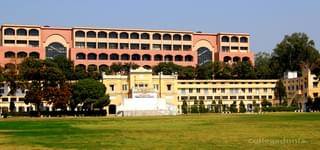BSc Agriculture is a 4 year undergraduate program specializing in providing knowledge about Agriculture and different techniques of Agriculture, Agriculture management, Agriculture finance, Agro-informatics, organic farming etc.
See Also:
The syllabus of BSc Agriculture 3 year comprises core as well elective subjects and includes theoretical as well as practical subjects. Some of the subjects include Integrated pest management, Watershed management, Crop Improvement (Kharif and Rabi Crops), Management of Beneficial Insects, Entrepreneurship Development and Business Communication etc.
Table of Contents
BSc Agriculture Course Details
Some of the major details of BSc Agriculture are tabulated below for your reference,
| Degree | Undergraduate |
| Full form | Bachelor of Science in Agriculture |
| Duration | 4 years |
| Age | Candidate must be minimum 17 years |
| Minimum Eligibility | Candidates must have completed an undergraduate degree in Science with a minimum of 50% or above from a recognized institute |
| Average Fees | INR 10,000 - 5,00,000 for the entire duration |
| Average Salary | INR 2.50 L - 4.40 LPA |
| Employment Roles | Research Scientists, Quality Control Chemist, Quality Assurance Manager, Clinical research Associate, Data Analyst, Food Technologist, Marketing Executive |
| Employment Sectors | Pharmaceutical Industry, Chemical Firms, Actuaries, Research Centers, Public Relation, Academic Institutions |
| Top Recruiters | Cargill, Bayer, Syngenta, John Deere, CNH Industrial Dupont |
BSc Agriculture 3rd Year Syllabus
BSc Agriculture Third year comprises theoretical subjects rather than practical subjects. These subjects relate to Integrated and pest disease management, manures, fertilizers, rain field agriculture, management of beneficial Insects, organic farming etc. The syllabus of BSc Agriculture is tabulated below for your reference,
| Semester V | Semester VI |
|---|---|
| Principles of Integrated Pest and Disease Management | Rainfield Agriculture & Watershed Management |
| Manures, Fertilizers and Soil fertility Management | Protected Cultivation and Secondary Agriculture |
| Diseases of Field and Horticultural crops and their management | Diseases of Field and Horticultural crops and their management-I |
| Crop Improvement-I (Kharif Crops) | Management of Beneficial Insects |
| Entrepreneurship Development and Business Communication | Crop Improvement-II (Rabi Crops) |
| Geoinformatics and Nano Technology and precision Farming | Principles of Organic Farming |
| Practical Crop Production- Kharif Crops | Farm Management, Production & Resource Economics |
| Intellectual Property Rights | Principles of Food Science and Nutrition |
BSc Agriculture 3rd Year Subjects
BSc Agriculture third year course comprises core subjects as well as elective subjects. Some of the important topics covered are integrated pest disease management, manures, fertilizers, rain field agriculture, management of beneficial Insects, organic farming etc. Let’s discuss these above subjects in detail,
See Also:
BSc Agriculture Fifth Semester Subjects
- Principles of Integrated Pest and Disease Management - This includes categories of insect pests and diseases, IPM, principles and tools of IPM, Economic importance of insect pests, diseases and pest risk analysis, Methods of detection and diagnosis of insect pests and diseases etc.
- Manures, Fertilizers and Soil Fertility Management - This includes the knowledge of organic manures, methods of preparation of bulky and concentrated manures, fertilizer recommendation approaches, Integrated nutrient management etc.
- Pests of Crops and stored grain and their management- This includes a general account on nature and type of damage by different arthropod pests,the scientific name, order, nature of damage, and management of major pests and scientific name, order, family, control practice etc.
- Diseases of Field and Horticultural crops and their management-I- This includes Symptoms, etiology, disease cycle and management of major diseases of following crops: Field Crops such as Rice, blast, brown spot,tungro;Maize,etc.
- Crop Improvement-I (Kharif Crops)- This includes origin, distribution of species, pulses, oilseeds,fibers, fodders and cash crops, vegetable and horticultural crops, plant genetic resources, etc
- Entrepreneurship Development and Business Communication- This includes the concept of Entrepreneur, Entrepreneurship Development, Characteristics of entrepreneurs; SWOT Analysis & achievement motivation, Government policy and programs and institutions 27 for entrepreneurship development, Impact of economic reforms on Agribusiness, Agri Enterprises etc.
- Intellectual Property Rights - This includes an Introduction and meaning of intellectual property, brief introduction to GATT, WTO, TRIPs and WIPO, Treaties for IPR protection: Madrid protocol, Berne Convention, Budapest treaty, etc
See Also:
BSc Agriculture Sixth Semester Subjects
- Rainfield Agriculture & Watershed Management- This includes rainfed agriculture: Introduction, types, History of rainfed agriculture and watershed in India, Problems and prospects of rainfed agriculture in India; Soil and climatic conditions prevalent in rainfed areas; Soil and water conservation techniques, Drought etc.
- Protected Cultivation and Secondary Agriculture - This includes Green house technology, types of greenhouses, Plant response to Greenhouse environment, designing of greenhouses, Design criteria of green house for cooling and heating purposes etc.
- Diseases of Field and Horticultural crops and their management-II - This includes Symptoms, etiology, disease cycle and management etc.
- Post-harvest Management and Value Addition of Fruits and Vegetables - This includes Importance of post-harvest processing of fruits and vegetables, extent and possible causes of post harvest losses, Pre-harvest factors affecting postharvest quality, maturity, ripening and changes occurring during ripening etc.
- Management of Beneficial Insects - This includes the importance of beneficial Insects, Beekeeping and pollinators, bee biology, commercial methods of rearing, equipment used, seasonal management, bee enemies and disease. Bee pasturage, bee foraging and communication etc.
- Crop Improvement-II (Rabi Crops) - This includes origin, distribution of species, pulses, oilseed, fodder crops and cash crops, vegetable and horticultural crops etc.
- Principles of Organic Farming - This includes Organic farming, principles and its scope in India; Initiatives taken by Government (central/state), NGOs and other organizations for the promotion of organic agriculture; Organic ecosystem and their concepts etc.
See Also:
BSc Agriculture Elective Subjects
BSc Agriculture Final year subjects comprise elective subjects as well which include subjects such as,
- Agri-Business Management
- Crop Improvement and Food safety
- Integrated crop management
- Applied Horticulture
- Agro-Industrial Training
- Commercial Beekeeping
- Mushroom Cultivation Technology
- Seed Production and Technology
- Soil, Plant, water and Seed testing
- Floriculture and Landscape Architecture
Top BSc Agriculture Colleges in India
There are more than 600 colleges in India offering BSc Agriculture programs where only 20% of the colleges are government colleges, rest of the colleges are deemed or private colleges. Some of the top colleges are tabulated below for your reference,
BSc Agriculture 3rd Year Syllabus: FAQs
Ques. What are the subjects of BSc Agriculture Third Year?
Ans. Some of the subjects included in BSc Agriculture Third year integrated and pest disease management, manures, fertilizers, rainfield agriculture, management of beneficial Insects, organic farming etc
Ques. What is the syllabus of BSc Agriculture Third year ?
Ans. The syllabus of MCA includes integrated and pest disease management, manures, fertilizers, rainfield agriculture, management of beneficial Insects, organic farming etc.
Ques. What are the BSc Agriculture Elective subjects ?
Ans. The BSc Agriculture elective subjects include Agri business management, crop improvement and food safety, integrated crop management, Applied horticulture, commercial beekeeping etc. .
Ques. How many semesters are there in BSc Agriculture ?
Ans. There are a total of 8 semesters in BSc Agriculture.
Ques. Is BSc Agriculture useful or not?
Ans. Yes, BSc Agriculture offers a wide range of opportunities in both private as well as public sector.
Ques. What is the syllabus of BSc Agriculture entrance exam?
Ans.. The syllabus of BSc Agriculture entrance exam includes Biology, Physics, Agriculture, chemistry and Mathematics etc.
Ques. Do I need a minimum aggregate marks for getting admission in BSc Agriculture ?
Ans. Yes, a candidate must have scored a minimum of 50% or above to get admission in BSc Agriculture.
Ques. Does BSc Agriculture offer Field trips ?
Ans. Yes, Field trips are part of the BSc Agriculture curriculum.
Ques. Is BSc Agriculture good for girls?
Ans. Yes, BSc Agriculture can be a very good study option for candidates.
Ques. What are the average fees of BSc Agriculture ?
Ans. The average fees of BSc Agriculture is INR 6000 - 1.50 LPA.


![Siksha 'O' Anusandhan University - [SOA]](https://image-static.collegedunia.com/public/college_data/images/appImage/1737985425Screenshot20250127191243.png?h=150&w=320&mode=stretch)
![Roorkee Institute of Technology - [RIT]](https://image-static.collegedunia.com/public/college_data/images/appImage/1707201237CDCoverPage11.jpg?h=150&w=320&mode=stretch)



![Mangalayatan University - [MU]](https://image-static.collegedunia.com/public/college_data/images/appImage/1587063265bld.png?h=150&w=320&mode=stretch)

![Maharaja Agrasen Himalayan Garhwal University - [MAHGU]](https://image-static.collegedunia.com/public/college_data/images/appImage/1583990018g1.jpeg?h=150&w=320&mode=stretch)

Comments